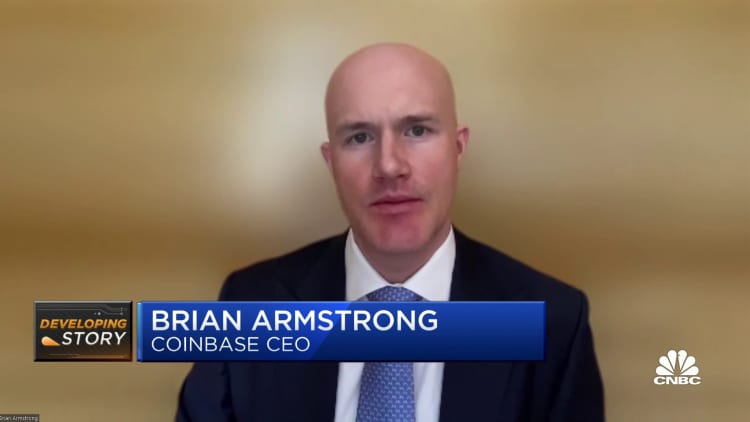Coinbase shares closed down more than 8% Monday, extending a slide that's pushed the crypto exchange to its lowest point since its market debut in April 2021. The drop comes as bitcoin's slump continues and investors worry about contagion from FTX's spectacular collapse earlier this month.
Nineteen months after going public with a market cap of over $85 billion, Coinbase has fallen below the $10 billion mark and has lost over a quarter of its value in the past four trading sessions.
Questions have been swirling about the health of FTX's rival exchanges, sparking industrywide sell-offs that have caused some companies to temporarily suspend trading, and others to prepare potential bankruptcy filings. Mizuho analysts wrote in a note on Friday that daily volumes in the industry are trending 30% to 40% below their average for the year.
Coinbase CEO Brian Armstrong said in an op-ed for CNBC on Nov. 11 that his company does not have "any material exposure to FTX," but that he has "sympathy for everyone involved." Coinbase shares are down more than 83% year to date.
"It's stressful any time there is potential for customer loss in our industry, and a lot of people are losing a lot of money as a result of FTX's struggles," Armstrong said.
Bank of America downgraded Coinbase on Friday, citing "contagion risk" for the cryptocurrency exchange platform, even if it is not "another FTX."
"That does not make them immune from the broader fallout within the crypto ecosystem," wrote Bank of America's Jason Kupferberg.
Prior to FTX's descent, the market was in the midst of a crypto winter that had sent prices of bitcoin and ethereum tumbling and forced a number of firms into bankruptcy. Earlier this month, Coinbase reported a revenue plunge of more than 50% in the third quarter from a year earlier, and a loss of $545 million. In June, the crypto exchange slashed 18% of its workforce.
The subsequent sell-off has been even more extreme, with bitcoin falling more than 3% on Monday to its lowest level in over two years, and ethereum off over 6%. Solana, a coin that was touted and backed by FTX founder Sam Bankman-Fried, has lost over two-thirds of its value in two weeks.
In a matter of days, FTX went from a $32 billion valuation to bankruptcy as liquidity dried up, customers demanded withdrawals and rival exchange Binance ripped up its nonbinding agreement to buy the company. FTX filed for Chapter 11 bankruptcy protection Nov. 11.
Bankman-Fried said the company's assets were "fine" two days before he was desperate for a rescue. He has since said in tweets that he's trying to recover deposits for the company's customers.
WATCH: CNBC's full interview with Coinbase CEO Brian Armstrong



